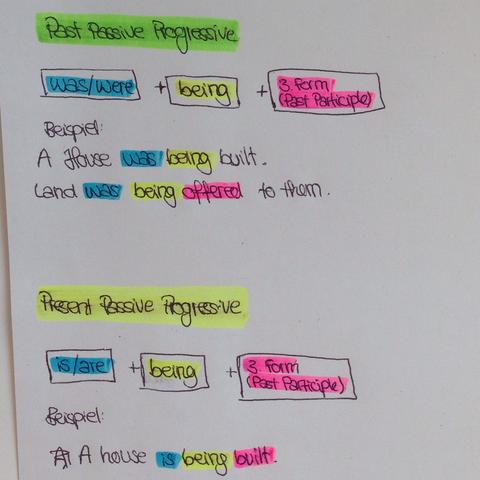Englisch Present/Past Passive Progressive. So richtig?
Ich schreibe bald eine Arbeit in Englisch. Ich fasse vor jeder Arbeit immer alle Regeln zusammen, aber ich bin mir nicht ganz sicher, ob das so, wie ich es mir aufgeschrieben habe (siehe Bild), richtig ist.
Ich würde mich freuen, wenn mal jemand drübergucken könnte und sagen könnte ob das so richtig ist und wenn nciht, was falsch ist. Danke schonmal im Voraus :)

3 Antworten
Hallo,
wenn du house klein schreibst sind die beiden Formen ok.
Das Passiv wird gebildet mit einer
Form von to be + Past Participle
(bei regelmäßigen Verben: Verb mit –ed; bei unregelmäßigen Verben: 3. Spalte)
Hier Beispiele zu den verschiedenen Zeitformen:
Present simple :
Aktiv : Sie bauen jedes Jahr ein Haus. They (subject) build a house (object) every year.
Passiv : Ein Haus wird jedes Jahr von ihnen gebaut. A house (subject) is built by them (object) every year.
Present Progressive :
A : They are building a house at the moment. P: A house is being built by them at the moment.
Past Simple :
A : They built a house last year. P: A house was built by them last year.
Past Progressive :
A : They were building a house while ... P: A house was being built by them while...
Present Perfect :
A : They have not built a house yet. P: A house has not been built by them yet.
Past Perfect :
A : They moved to Berlin after they had built a house. P: They moved to Berlin after a house had been built by them.
Will-Future :
A : They will build a house next year. P: A house will be built by them next year.
Going to-Future :
A : They are going to build a house next year. P: A house is going to be built by them next year.
Conditional :
A : They would build a house, if... P: A house would be built by them, if...
Nach den Modal/Hilfsverben
must, shall, should, have to, ought to, mustn't, can, can't, will, would, may, might ...
wird das Passive Infinitive verwendet.
Achtung : mit Modal Verben benutzt man den Infinitive ohne to (Ausnahmen: ought to, have to)
Beispiele :
A : We can help her. P: She can be helped by us.
A : You must do your homework. P: Your homework must be done.
A : He may invite us. P: We may be invited by him.
A : Someone ought to help her. P: She ought to be helped.
Die Grammatik und Übungen zum Passiv findest du auch im Internet, u.a. bei ego4u.de und bei englisch-hilfen.de.
:-) AstridDerPu
Schön, dass dir meine Antwort gefallen hat und danke für das Sternchen!
AstridDerPu
Ich glaub da muss beim Verb hinten ein 'ing' mir hin z.b the House is building
Hi.
Du hast die "Bauregeln" korrekt aufgeschrieben (bei Nr. 1 schreib bitte "house), und die Beispiel sind in Ordnung.
Viel Erfolg!
earnest